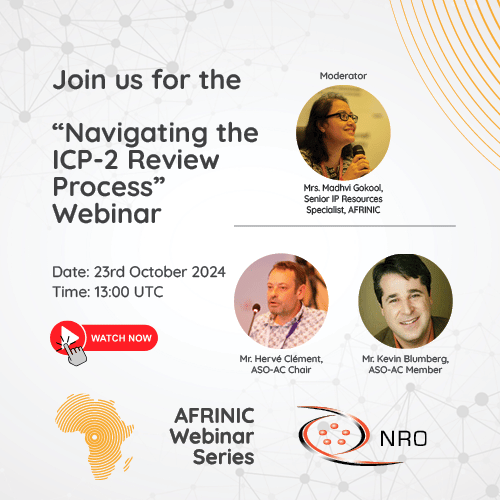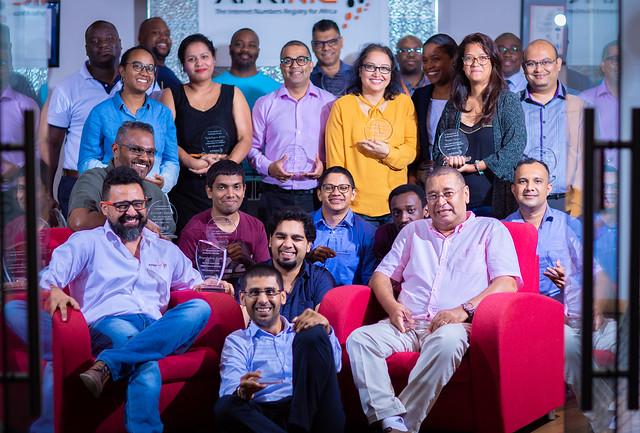AFRINIC is 1.85 million /32s IPv4 away from Phase 2 of IPv4 exhaustion
As of 16 October 2019, AFRINIC has 3.9 million /32s addresses in the available IPv4 pool. We are now 1.85 million /32s addresses away from the /11 threshold which will trigger Phase 2 of IPv4 exhaustion. Consequently, we expect to reach Phase 2 of IPv4 exhaustion by the end of this year.
AFRINIC is still managing Internet number resources as per the requirements outlined in existing policies (the "Phase 1") but this will change as soon as the threshold for "Phase 2" is reached. The AFPUB-2010-v4-005: IPv4 Soft Landing community-developed policy can be found here: www.afrinic.net/library/policies/697-ipv4-soft-landing-policy
AFRINIC's available inventory of IPv4 space is updated daily at https://afrinic.net/stats/ipv4-pool
GUIDANCE FOR MEMBERS
All AFRINIC Resource Members are encouraged to get acquainted with AFPUB-2010-v4-005: IPv4 Soft Landing Policy, available at https://afrinic.net/policy/manual#Soft-Landing
In addition to the policy, please refer to the communique, dated 19 August 2019, announcing AFRINIC's approach of Phase 2 of IPv4 Exhaustion: https://www.afrinic.net/2019-08-19-afrinic-approaches-ipv4-exhaustion-soft-landing-phase-2
To ensure timely evaluation of all Internet number resource requests, members are requested to ensure that:
REQUEST HANDLING
Applications are processed on a first-come-first-served basis. While processing Incomplete resource requests applications, the applicants will be informed of the pending supporting information and evaluation shall be concluded once the applicant has provided all the required information. Upon conclusion of the evaluation, the resource requests will undergo a review by a second IP Resource Analyst and Registration Services Manager.
Fairness, consistency and due diligence shall be the highest priority of AFRINIC during this final countdown to Soft Landing Phase 2. AFRINIC will strive to respect the Service Level Commitment of two working days when processing the resource requests tickets.
AFRINIC has implemented an approval delay to ensure that the requests are correctly evaluated. The final approval of the prefix size shall be done in the correct order by the Registration Services Manager. It will also enable AFRINIC to find any undelegated prefixes. All final approvals shall happen on a Friday.
Once the resource requests have been approved, AFRINIC shall proceed and invoice the applicant based on the type and size of the approved prefix. The approved prefix will be reserved for up to 45 days, awaiting the payment of the invoiced amount. For new membership applications, the duly filled and signed Registration Service Agreement(RSA) must also be sent to AFRINIC within the same 45 days. If the payment and/or the RSA are not received within 45 days, the reserved resource will be returned to the available pool and the applicant will need to submit a new request.
CRITERIA FOR THE START OF EXHAUSTION PHASE 2
Section 5.4.3.1 of the CPM specifies the following criteria for the end of Phase 1 and the start of Exhaustion Phase 2:
"Allocations and assignments will be made from the Final /8 or from any other IPv4 address space available to AFRINIC until no more than a /11 of non-reserved space is available in the Final /8. At this point, the Exhaustion Phase 2 will begin. For the avoidance of doubt, all applications will be in the process at this point will be evaluated as per the new policy."
AFRINIC will implement the specified criteria as follows:
- Exhaustion Phase 1 ends and Exhaustion Phase 2 begins when AFRINIC has no more than one /11 of non-reserved IPv4 space available in the final /8. (CPM section 5.4.3.1.) The policy does not specify whether the /11 must be contiguous, or may be made up of multiple smaller blocks adding up to the same amount of space.
- AFRINIC's interpretation is that the /11 may be made up of multiple smaller blocks. Accordingly, Exhaustion Phase 2 will begin when the available non-reserved space in the final /8 is no more than 2,097,152 IP addresses (the same amount as a /11), regardless of how the available addresses are arranged in contiguous or discontiguous blocks. Nevertheless, AFRINIC will endeavour to keep a contiguous /11 set aside for as long as reasonably feasible.
- When AFRINIC approves a request for IPv4 resources that cannot be fulfilled from the IPv4 address space available (except the last /11) in the AFRINIC pool, Phase 2 of IPv4 Exhaustion shall be triggered. If an application on the pre-approved list cannot be satisfied in full, the applicant will have the option of either getting an amount of IPv4 addresses that are as close as possible to the requested block or receive up to a /22 from the pool reserved for Phase 2.
NO GUARANTEE OF AGGREGATION OR CLEANLINESS
AFRINIC does not guarantee that the IP space to be delegated to the members will be aggregated. For example, an organisation requesting a /17 IPv4 may receive multiple prefixes, the combined total of which will be equivalent to a /17 IPv4.
AFRINIC shall also issue recovered space (from resource returns and revocations). These resources have been cleaned up (no route objects or routing advertisements) but could be listed in IP-based blacklists. Members receiving such blocks will be notified.
CHANGES IN EXHAUSTION PHASE 2
When Exhaustion Phase 2 begins, most current IPv4 policies continue to apply, but certain changes take effect.
- Minimum IPv4 Allocation or Assignment shall be /24. (CPM section 5.4.3.2.)
- Maximum IPv4 Allocation or Assignment shall be /22. (CPM section 5.4.3.2.)
- No explicit limit on the number of times an organisation may request additional IPv4 space. (CPM section 5.4.4.)
- Allocation/Assignment period (planning window) is eight (8) months. (CPM section 5.4.5.)
- Existing Resource Members are eligible to get additional blocks if 90% efficient usage of all resources has been demonstrated. (CPM section 5.4.6.1.)
- Use of AFRINIC IPv4 resources outside the AFRINIC service region should be solely in support of connectivity back to the AFRINIC region. (CPM section 5.4.6.2.)
Please see the relevant sections in the Consolidated Policy Manual for more information: https://afrinic.net/policy/manual
FUTURE INFORMATION
AFRINIC will issue another communique when Exhaustion Phase 2 begins.
More information:




